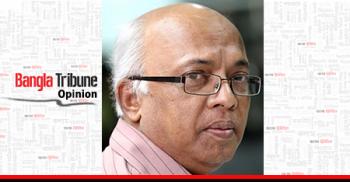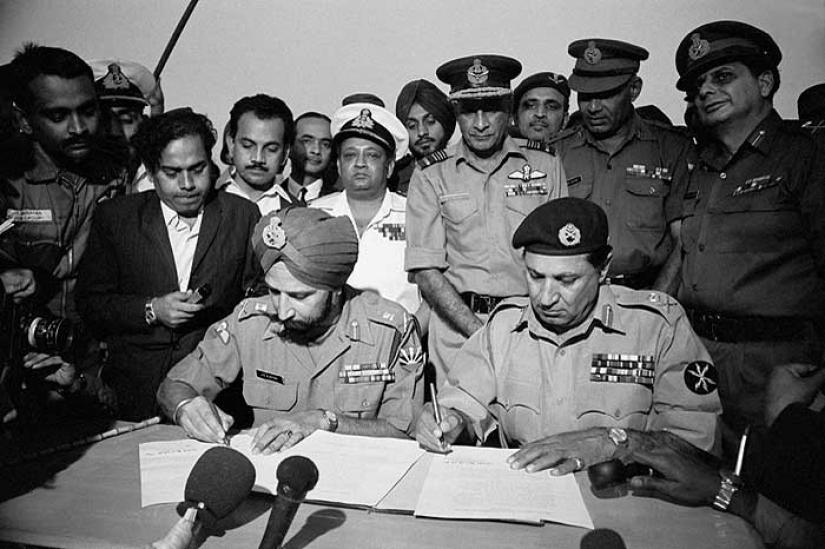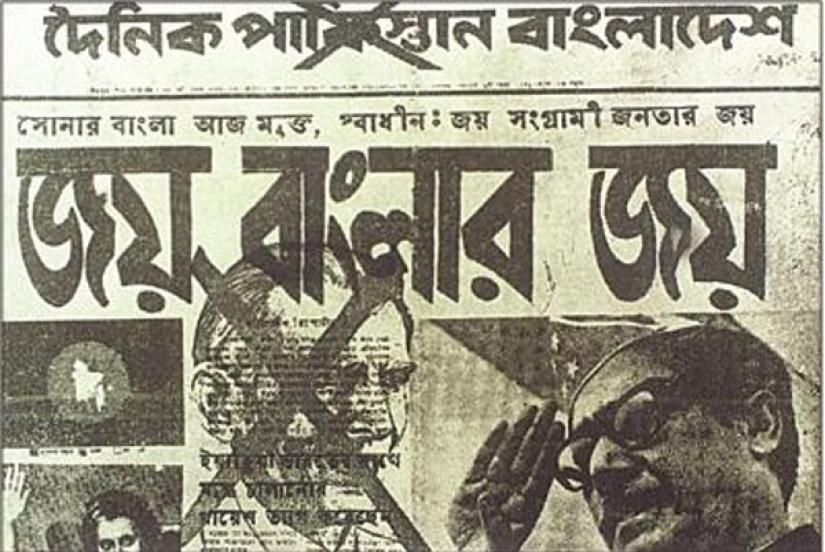 The season of victory is once again upon the Bengali nation. It's Victory Day today, a celebration of life, a remembrance of lives sacrificed in a war against medieval barbarity.
The season of victory is once again upon the Bengali nation. It's Victory Day today, a celebration of life, a remembrance of lives sacrificed in a war against medieval barbarity.
Forty-seven winters ago, in December 1971, the People’s Republic of Bangladesh emerged into life over the ashes of what had effectively been, till midnight of March 25-26 of the year, the eastern province of the Islamic Republic of Pakistan. Slogans of Joi Bangla rent the air as the nearly hundred thousand strong Pakistan military surrendered to the combined assault of the Mukti Bahini and the Indian army. It was pure joy to be alive. It was, in a great way, a restoration of our faith in history when General AAK Niazi and his men, defeated comprehensively in war, capitulated on a declining December afternoon.
By 1 December 1971, the War of Liberation had taken a decisive shape owing to the enhanced and effective assaults of the Mukti Bahini, especially in the border regions. Additionally, in the urban centres and particularly in Dhaka, guerrilla movements became increasingly more pronounced. A sign of that was the growing instances of explosions in areas where the military junta was thought to have a presence, be it in terms of infrastructure or troop concentrations. The rural regions had by the first day of December turned into a veritable death trap for Pakistan’s soldiers. The feeling had begun to grow that the occupation forces were fast finding themselves in a constantly shrinking area of operation.
 But, of course, these ground realities were ignored by the Yahya Khan regime in Rawalpindi, at least in public. It went into desperate sabre-rattling against India and into harshly abusive mode against the Mukti Bahini, which for it was but a ragtag band of ‘miscreants’. In late November, a group of pro-Pakistan Bengali politicians had travelled to Rawalpindi, the ostensible purpose being to seek ways of a ‘transfer of power’ to the elected representatives of the people. The irony was not missed: the elected representatives of the people who had won a majority at the general elections just a year earlier and who had been brutally deprived of power were at the time marching steadily toward creating the new state of Bangladesh. It was no more a question for them to ask for power. It was a new reality of burying the very state which had deprived them of power in the bloodletting of its own making.
But, of course, these ground realities were ignored by the Yahya Khan regime in Rawalpindi, at least in public. It went into desperate sabre-rattling against India and into harshly abusive mode against the Mukti Bahini, which for it was but a ragtag band of ‘miscreants’. In late November, a group of pro-Pakistan Bengali politicians had travelled to Rawalpindi, the ostensible purpose being to seek ways of a ‘transfer of power’ to the elected representatives of the people. The irony was not missed: the elected representatives of the people who had won a majority at the general elections just a year earlier and who had been brutally deprived of power were at the time marching steadily toward creating the new state of Bangladesh. It was no more a question for them to ask for power. It was a new reality of burying the very state which had deprived them of power in the bloodletting of its own making.
The collaborator-politicians were to be trapped in Pakistan, for soon December 16 would upset everyone’s calculations. It was a matter of supreme irony that even as Niazi signed the Instrument of Surrender in Dhaka, the tottering Yahya junta distributed draft copies to local and foreign newsmen in Rawalpindi of a proposed constitution envisaged for Pakistan by the regime. Half of Pakistan had gone by then. East Pakistan had simply ceased to be.
As December began, the Yahya Khan regime prepared to hand down a sentence of death on the incarcerated Bangabandhu Sheikh Mujibur Rahman following a sham military trial in camera. Bangabandhu had been detained since March and in his name, his lieutenants had been waging the war for freedom. By 1 December, the Bengali freedom fighters could tell themselves that it was possible for them to breach and storm the citadel of the enemy.
In Dhaka, the puppet civilian administration of Dr. Abdul Muttalib Malek, dictated to and guided by Pakistan army officers, began to demonstrate signs of nervousness as the full weight of the situation swiftly began to dawn on it. Malek and his cabinet would resign some days later in the intense bombing launched by the Indian air force on Governor’s House (today’s Bangabhaban). They would then be escorted to the neutral zone designated for the collaborator regime and civilian officials from West Pakistan and their families at Hotel Intercontinental.
 December 1971 would symbolise a glory that was to be etched for all time in the collective Bengali consciousness. December is thus that time of year when the softness of dawn complements the tenderness of twilight, to remind us of the dreams that powered us to liberty through a long, tortuous valley of death. In December, the nation recalls in profound solemnity the three million of our compatriots, including those abducted and murdered by the goon squads of the Jamaat-e-Islami on the eve of victory, whose lives were snuffed out by an enemy in a demonstration of medieval barbarity.
December 1971 would symbolise a glory that was to be etched for all time in the collective Bengali consciousness. December is thus that time of year when the softness of dawn complements the tenderness of twilight, to remind us of the dreams that powered us to liberty through a long, tortuous valley of death. In December, the nation recalls in profound solemnity the three million of our compatriots, including those abducted and murdered by the goon squads of the Jamaat-e-Islami on the eve of victory, whose lives were snuffed out by an enemy in a demonstration of medieval barbarity.
In December, Bengalis recall the annus mirabilis they lived through forty-seven years ago.
December is a season for Joi Bangla to reverberate across the land.
It is a reminder of the secular state we built out of the crucible of war in 1971.
It is a warning that a crumbling of that secular edifice of the state will put at risk all the dreams we wove through the 1960s, all the realities we put in place in the early 1970s.
16 December speaks of our ethos. It defines us as a people. It is a reason for our being.
Syed Badrul Ahsan is Editor-in-Charge, The Asian Age


